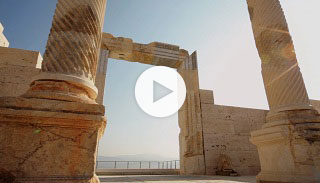2:1–5 Paul beings this chapter by assuring the Colossians that Christ reveals the full truth of God. |
2:1 struggle This seems to refer to Paul’s deep concern for the believers. He also might be referring to his intense effort in prayer.
Laodicea A city about 11 miles from Colossae.
2:2 mystery of God In mystery cults, a mystery was a secret ritual that supposedly established a relationship with a god and resulted in perceived benefits such as immortality. The Colossians likely knew of such teachings from their culture. Paul uses the term “mystery” to refer to Christ, who reveals and fulfills God’s plan of salvation. See note on 1:26.
a mystery was a secret ritual that supposedly established a relationship with a god and resulted in perceived benefits such as immortality. The Colossians likely knew of such teachings from their culture. Paul uses the term “mystery” to refer to Christ, who reveals and fulfills God’s plan of salvation. See note on 1:26.
2:3 wisdom and knowledge Jewish traditions prized wisdom, and mystery cults valued knowledge. Paul affirms Christ as the true source of both. Since the believers of Colossae have Christ (1:27), they have no need for the wisdom and knowledge offered by false teachers.
and mystery cults valued knowledge. Paul affirms Christ as the true source of both. Since the believers of Colossae have Christ (1:27), they have no need for the wisdom and knowledge offered by false teachers.
2:4 persuasive speech Ancient philosophers used lofty arguments to persuade their audiences. Paul warns the Colossians that such teachings may appear logical, but their conclusions are false.
2:6–15 This passage builds on Paul’s remarks in vv. 2–3. Because Christ represents the full revelation of God (vv. 3, 9), and because believers are united with Christ (vv. 6, 10), the Colossians can be confident of their salvation and the defeat of worldly powers (vv. 7, 13–15). |
2:6 you have received The Greek word used here, paralambanō, can refer to the reception of a tradition —in this case, the message of the gospel handed down from the apostles (Acts 2:42; 2 Thess 3:6). Paul urges the Colossians to continue in this tradition, which contrasts with the human traditions of false teachers (Col 2:8).
—in this case, the message of the gospel handed down from the apostles (Acts 2:42; 2 Thess 3:6). Paul urges the Colossians to continue in this tradition, which contrasts with the human traditions of false teachers (Col 2:8).
2:7 firmly rooted and built up Indicates the stability that the Colossians have in Christ. Old Testament writers used similar imagery to describe those who are faithful to God (Psa 1:3; Isa 61:3).
2:8 philosophy and empty deceit The false teaching that Paul opposes in this letter is sometimes called “the Colossian heresy.” This philosophy cannot be identified precisely; it could reflect the influences of several ancient traditions, including Judaism, mysticism, asceticism, mystery cults, and Gnosticism (see note on Col 1:22). Regardless of the specific teachings, the fundamental problem Paul identifies is that human rules and traditions are being recommended as necessary supplements to Christ. However, it is also possible that Paul is not correcting a particular false teaching. Instead, Paul could be concerned with the immaturity and ignorance of the Colossian believers.
human tradition Refers to teaching that has its origin in human beings. In contrast, the gospel message has its origin in God (Gal 1:11).
elemental spirits The Greek phrase used here could refer to several concepts: the basic religious teachings of Jews and Gentiles; the material parts of the universe (such as water, earth, and fire); or spiritual powers (such as evil spirits or demonic entities). In this context, the first and third options are most likely. Paul makes clear that these teachings or forces are negative influences.
or demonic entities). In this context, the first and third options are most likely. Paul makes clear that these teachings or forces are negative influences.
 New Testament Terms for Unseen Divine Beings
New Testament Terms for Unseen Divine Beings
2:9 fullness of deity The very nature of God is fully present in Christ. False teachers may have asserted that Christ was one of many divine beings or that God’s fullness was distributed throughout supernatural beings, not just Christ—claims that Paul rejects.
2:11 circumcision Although the physical act of circumcision was a sign of Jewish identity within the covenant, God continually expresses concern for circumcision of the heart (Deut 10:16; Jer 4:4; Rom 2:29). Here, Paul affirms that the Colossians already have received Christ’s spiritual circumcision through their union with Him in baptism; therefore, they do not need the sign of physical circumcision to legitimize their identity as God’s people.
was a sign of Jewish identity within the covenant, God continually expresses concern for circumcision of the heart (Deut 10:16; Jer 4:4; Rom 2:29). Here, Paul affirms that the Colossians already have received Christ’s spiritual circumcision through their union with Him in baptism; therefore, they do not need the sign of physical circumcision to legitimize their identity as God’s people.
2:12 baptism The sacrament of washing with water as a sign of Christian commitment. Through baptism, believers identify with Christ’s crucifixion and burial, symbolizing death to sin.
you were raised together with him Paul often speaks of being raised with Christ as a future event (e.g., Rom 6:5; 1 Thess 4:16–17). In this verse, however, the Greek verb indicates a past event: The Colossians already have been raised with Christ in some sense. Paul likely intends to counter any uncertainty about salvation that the false teaching might have generated.
2:13 dead Paul refers to the Colossians’ situation prior to faith and baptism, when they lived apart from Christ.
2:14 certificate of indebtedness The Greek term used here means “handwriting,” but it denotes a written record of indebtedness. The initial image is one of tearing up or burning a debt record, although later in the verse this document is nailed to the cross. Paul is confirming the significance of the crucifixion: Through His sacrificial death, Jesus both embodies the debt of human sin and wipes it out (compare Rom 8:3; 2 Cor 5:21). It is also possible that the expression refers to the regulations of the Mosaic law, which Paul also discusses in Col 2:20–23. In this case, the law functions like a record book of humanity’s sins (compare Rom 4:15; Gal 3:19–22).
2:15 disarmed the rulers and the authorities This verse describes Christ exposing, defeating, and subjugating the hostile spiritual powers (compare Luke 10:18; John 12:31; 1 Pet 3:22).
2:16–23 Because God’s presence, salvation, and victory are revealed fully in Christ (Col 2:9–15), He is sufficient for the Colossians’ salvation. There is no need to pursue additional teachings or practices. |
2:16 judge The Greek word used here, krinō, can mean “to condemn”; it also can refer to assessing value.
eating or drinking The criteria listed in this verse correspond with Jewish practices like food laws and calendar observances.
2:17 shadow of what is to come Although Israelites were required to observe food laws and certain days, Paul asserts that the law ultimately points to Christ (compare Rom 10:4; Gal 3:24).
2:18 taking pleasure in humility Likely refers to ascetic practices (see note on Col 2:21).
worship of angels The Greek phrase used here could indicate people worshiping angels or being led in worship by angels. The latter might refer to the heavenly worship liturgy mentioned in several ancient Jewish traditions.
things which he has seen Probably refers to visionary experiences.
2:19 head Paul emphasizes the need for believers (the body) to be connected to Christ (the head). See note on 1:18.
2:20 elemental spirits Since Christ has defeated the powers and authorities (v. 15), those in union with Christ must not subject themselves to other forces (see note on v. 8; compare Gal 4:8–9).
 New Testament Terms for Unseen Divine Beings
New Testament Terms for Unseen Divine Beings
2:21 do not handle, do not taste, do not touch These appear to represent regulations set by the false teachers, who were promoting ascetic practices (abstaining from worldly comforts and pleasures) as the means to holiness and salvation.
(abstaining from worldly comforts and pleasures) as the means to holiness and salvation.
2:23 an appearance of wisdom The false teaching might have sounded convincing, but it ultimately was futile because it did not address the root of the problem: sin. In Christ, however, the worldly powers of sin have been defeated. Believers have been raised to new life and therefore have no need for man-made rules (Col 2:12–15, 20).

|
About Faithlife Study BibleFaithlife Study Bible (FSB) is your guide to the ancient world of the Old and New Testaments, with study notes and articles that draw from a wide range of academic research. FSB helps you learn how to think about interpretation methods and issues so that you can gain a deeper understanding of the text. |
| Copyright |
Copyright 2012 Logos Bible Software. |
| Support Info | fsb |
 Loading…
Loading…



